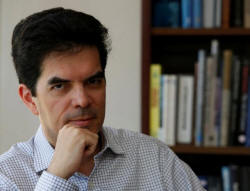|
Activist investor calls
Hong Kong market rout
 Send a link to a friend
Send a link to a friend
 [June 28, 2017]
By Michelle Price [June 28, 2017]
By Michelle Price
HONG KONG (Reuters) - Six weeks ago, David
Webb, an activist investor and former director of the Hong Kong
exchange, issued a report titled "The Engima Network: 50 stocks not to
own". On Tuesday, most of the shares he named abruptly plunged, pointing
to chronic regulatory problems over small-cap shares in the Asian
financial hub.
Webb's report mapped out a complex web of cross-shareholdings between
companies listed on both the main board and its sibling, the Growth
Enterprise Market, which he said created a breeding ground for
volatility.
Tuesday's biggest decliners showed characteristics that have long
worried regulators and which Webb highlighted in his report: high
shareholding concentrations, unrealistic valuations, and complex
relationships between companies and listed brokerages.
The Hong Kong government and regulators are growing increasingly
concerned that a series of company scandals, many of them centered on
mainland companies listed in Hong Kong, have tarnished the territory's
reputation as a financial center as it marks the 20th anniversary of its
handover to China this weekend.

Webb, a successful investor and author who studied mathematics at
Oxford, told Reuters on Wednesday he had come across the network through
his own research into annual reports and company disclosures.
"I picked up on this network years ago when they started building it.
The meltdown shows these stocks are closely related," he said.
His report only covers cross-shareholding relationships but the
companies also have many directors in common as well as related
transactions, Webb said.
The purpose of such networks, Webb said, "is to defraud investors -
extract and misappropriate money and part of that involves manipulating
stocks."
'DUMP AND RUN'
Webb, an outspoken critic of the Hong Kong market since he quit the HKEX
board in 2008, said it was unclear what triggered Tuesday's sell-off.
“I can only speculate. But it’s possible margin calls have been
triggering the sell-off. It’s possible the brokers involved have been
told to stop lending against those shares ... Maybe the people operating
the network have decided to dump and run.”
Webb said he never shorts Hong Kong shares.
"The bigger picture here is that this again reminds us that the current
regulatory system is not working and these problems have been allowed to
build up by the Hong Kong exchange (HKEX)." He also blamed the
independent market regulator, the Securities and Futures Commission (SFC),
"for not stopping it."

An SFC spokesman declined to comment on whether the regulator was
investigating any of the companies in the network.
In a statement, the SFC said: "The stocks which have experienced large
price declines yesterday occupy a market segment characterized by thin
turnover, small public floats, high shareholding concentrations, and
multiple relationships between different companies and listed brokerage
firms. These characteristics can be especially conducive to extreme
volatility and also to market misconduct."
[to top of second column] |

Activist shareholder David Webb poses in Hong Kong, China June 28,
2017. REUTERS/Bobby Yip

The exchange denied speculation on Tuesday it was planning to delist thinly
traded shares.
WLS Holdings <8021.HK>, which had a market value of HK$409 million, was the
biggest loser on Wednesday with its shares sliding 47 percent, while
Greaterchina Professional Services Ltd <8193.HK> dropped 34 percent after a 93
percent drop on Tuesday.
REFORM IDEAS
Webb said he opposed a recent HKEX proposal to add a third board, catering to
start-ups, and argued the two existing boards should be merged and put under the
jurisdiction of the SFC.
The investor activist said Hong Kong also needs a class action legal provision
so investors can hold boards accountable. He said all companies should be
compelled to file results on a quarterly basis, with restrictions on how much
companies can invest in other stocks.
Webb, a member of the SFC's takeover panel, has been a thorn in the side of the
establishment and Hong Kong's mega-rich business elites through his public
commentary and eponymous "Webbsite" for much of the past 26 years he has been
resident in the city.
Last year, however, Webb told readers of his newsletter he would dial back his
commentary and public activism in frustration that his efforts had yielded
little change in the financial hub over the years.

The HK$28.6 trillion ($3.7 trillion) market has grown nine-fold since the former
British colony reverted to China rule in 1997, largely on an influx of listings
from mainland firms. They now make up two-thirds of market value and represent
90 percent of the funds raised from IPOs in the five years to 2016.
Investors seem to discount the market, with the Hang Seng index <.HSI> trading
at around 14 times earnings, versus 22 times for world stocks and 23 times for
U.S. equities.
The SFC, along with the Hong Kong stock exchange, have issued several warnings
over concentrated shareholdings in penny stocks listed on the GEM. The average
first-day price rise for a GEM company debut during the first half of 2016 was
454 percent due to such concentrations, SFC data shows.
This month the HKEX launched a wide-ranging consultation to try to address this
problem, including a proposal to raise the minimum market capitalization by 50
percent to HK$150 million and increasing the cash flow requirement for initial
listings.
(Reporting by Michelle Price; additional reporting by Donny Kwok in Hong Kong;
Writing and editing by Bill Tarrant)
[© 2017 Thomson Reuters. All rights
reserved.] Copyright 2017 Reuters. All rights reserved. This material may not be published,
broadcast, rewritten or redistributed. |